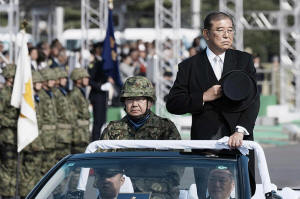|
Ishiba, who made the comments at an annual troop review held at
Camp Asaka in the Tokyo suburbs, said the security environment
surrounding Japan and the international community has
significantly worsened due to escalating tensions with China,
Russia and North Korea. He pledged to reinforce Japan’s military
power.
He said breaches of Japanese airspace by Chinese and Russian
warplanes earlier in the year “not only violated Japanese
sovereignty but also threatened the safety of Japan, and are
absolutely unacceptable.” He said Japan faces growing threats
from China’s accelerating military activity around Japanese
coasts and from North Korea’s repeated missile firings.
“As we face the most severe and complex security environment, I
will balance and strengthen Japan’s diplomacy and security,”
Ishiba said in his speech before hundreds of troops gathered for
the ceremony.
The Japan-U.S. alliance is the lynchpin for achieving this,
Ishiba said, pledging to elevate Japan's ties with the United
States and work closely with Trump as they agreed during a brief
telephone conversation Thursday.
Ishiba took office on Oct. 1, replacing his unpopular
predecessor Fumio Kishida but his governing coalition badly lost
a recent parliamentary election and could face difficulty
pursuing his party’s planned policies and budget plans in coming
months.
Ishiba pledged to pursue the ongoing military buildup plan under
the 2022 security strategy adopted by his predecessor, Fumio
Kishida, which calls for a counter-strike capability with
long-range cruise-missiles, a break from its self-defense only
principle. Ishiba said he will pursue strengthening of command
system to improve operation between Japanese and U.S. troops.
After its devastating defeat in World War II, Japan had
prioritized economic recovery over defense under its
war-renouncing constitution, but has steadily strengthened its
defense capability in recent years.
___
AP video journalist Mayuko Ono contributed.
All contents © copyright 2024 Associated Press. All rights
reserved |
|




